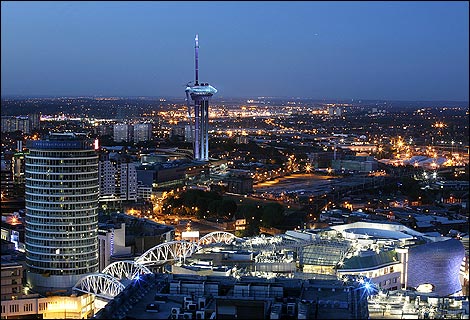Rolling into Birmingham on a train from London you’ll see what looks like a couple of derelict car parks and the odd flash of graffiti on the side of some disused building. Indeed, for this observer at least, Birmingham was almost reminiscent of Berlin, with its many concrete buildings and 60s architecture. On looks alone, it’s not hard to see how it gave birth to the bands Black Sabbath and Judas Priest.
But though the impression of a city that’s a little rough around the edges can work from some angles, the place has plenty to suggest it’s not quite ‘poor but sexy’ as Berlin has been described, especially when you realise the derelict building is earmarked with signage for development, and the car park has the word “Temporary” on it. Perhaps like Berlin did in the last few years, it’s getting it’s mojo back with new architectural developments like the Bullring, pictured:

Indeed, although Birmingham is sometimes forgotten because of the media dominance of Manchester in the world’s of football and music, Birmingham has the second-largest city economy in the UK after London, is a big employer in banking and finance and its university is regarded as part of the English “Ivy League”. From that basis and being only just over an hour from London, Birmingham looks like it might well have the making of a new hub for technology startups in Europe.
Birmingham is already drawing on a rich heritage. The most populous British city outside London, the city was prominent as part of the Industrial Revolution, which saw the city at the forefront of worldwide developments in science, technology and the kinds of innovations that laid many of the foundations of modern industrial society.
And the modern foundation stones for its future are today being re-laid. The UK government has marked the city out as an Enterprise Zone with simplified planning rules, super-fast broadband and over £150 million in tax breaks for new businesses over the next 4 years. A planned high-speed train link to London will cut the journey time from 1 hr 14 minutes to 49 minutes (although that won’t arrive until 2026).
 But crucially, it’s the people that are starting out today to make Birmingham into a new UK tech hub.
But crucially, it’s the people that are starting out today to make Birmingham into a new UK tech hub.
For starters, there’s clearly tech talent emerging. BufferApp which enables users to easily schedule Tweets and Facebook posts to be posted at a later time, raised $400,000 seed funding from a host of UK and US angels just last year.
In addition, last year a new accelerator emerged out of the city. Oxygen Accelerator uncharacteristically set out to welcome startups from anywhere in the world, with a £200,000 fund to cover 9-10 teams a year, on simple equity terms. This was backed, unusually, by local entrepreneur Mark Hales, a man who had made his money in the private healthcare industry, but who was passionate about bringing startups to Central England.
Hales has based his accelerator in existing facilities at Birmingham Science Park, nestled amongst a regional initiative known as E4F.
The difference, he says, is that Oxygen is open to anyone worldwide
Last year it had had nine startups in the programme, this year’s crop has produced eight. And now it plans to open its own co-working space: Tech Tropicana, set beside one of the many canals that played a key part in the city’s industrial past.
“Last year many teams just turned up with a sheet of paper. This year most already have MVPs and some traction,” he tells me.
He says the startups are bringing great technology to the programme but “it’s often the case that the sort of support these startups need most isn’t just technical advise, it’s business advice. Sales and marketing is also a major area they benefit from. We learnt the hard way last year that many young entrepreneurs can’t really sell their product, whether it’s B2B or B2C. Being able to pitch is one thing, but being able to work out how to open doors is a big hurdle,” he says.
The startups coming out this year are many and varied. Let’s take a quick look at them.
• Hobzy.com is for hobbyists and crafters. Aiming at the market with a Pinterest interface, it’s closer to a Tumblr in that users can edit their own themes.
• Soshi Games is a social game maker in the Zynga hold, but is an online music festivals Facebook game. But it’s more than FarmVille for music festivals. It allows music rights holders to earn money and reach new customers. Users can preview tracks and purchase them. It has potential for selling the virtual goods in the game like a band’s branded virtual goods. Bands signed so far include Bullet For My Valentine and Bring Me The Horizon. Bands get a rev share off branded virtual goods, incentivising them, and it even produces its own music chart.
• WHISK we’ve covered before, but this is considered a hot ticket in the UK right now, allowing users to buy whole recipes from supermarkets in a one-click basket purchase. Everyone does recipe to shopping list but none does shopping list to supermarket, which is why this is pretty clever.
• CrowdControl allows brands with a lot of social profiles to check on how they are working. It could be linked to Hootsuite or Tweetdeck, but in the main is appeals to Public sector bodies such as Leeds’ City Council, which has 98 social media accounts to manage all at once.
• Bertie and Bean is a clever ‘club’ model for parents of young children to swap clothes via a pre-paid post bag. The tech aspect is the platform for the back-end for the peer-to-peer postage service. Not quite a ‘Birchbox for baby clothes’ but it is a £1.5B market.
• Poikos cleverly measures your body’s dimensions and potential fit for clothes via laptop’s webcam. Similar but potentially more advanced that competitor Upcload out of Berlin.
• Mynaweb.com is designed to be a superior, realtime, alternative to AB testing for web sites based on highly sophisticated algorithms. It’s open beta has been featured on Hacker News a couple of times.
• Lastly, a stealth-mode smartphone plans to allow retail customers to send money to merchants anywhere for free, disrupting banking charges.
This is just a flavour of companies that are emerging from Oxygen, and as Hales says Oxygen has become a lot more than something he intended to dabble in.
“It’s taken over my life,” he says, “but I’ve learnt an enormous amount.”
On this evidence, the city could be well-positioned. However, a big question hangs over whether it can produce startups which can attract capital and grow into viable businesses. On that reading, London startups in theory have greater access to the VCs of Mayfair and the global talent pool of London megapolis.
Then again, in its favour Birmingham has potentially costs and a better standard of living for its talent, outside the cost vortex that is London.
So far at least, Birmingham’s tech scene is not about to wait for high speed trains to arrive. It’s getting on with the job of building its own tech startup scene amid the clashing architecture of its industrial past, the 60s and the new century to come.
